Special Issue: American Indian/Alaska Native Activities in the CTN |
|
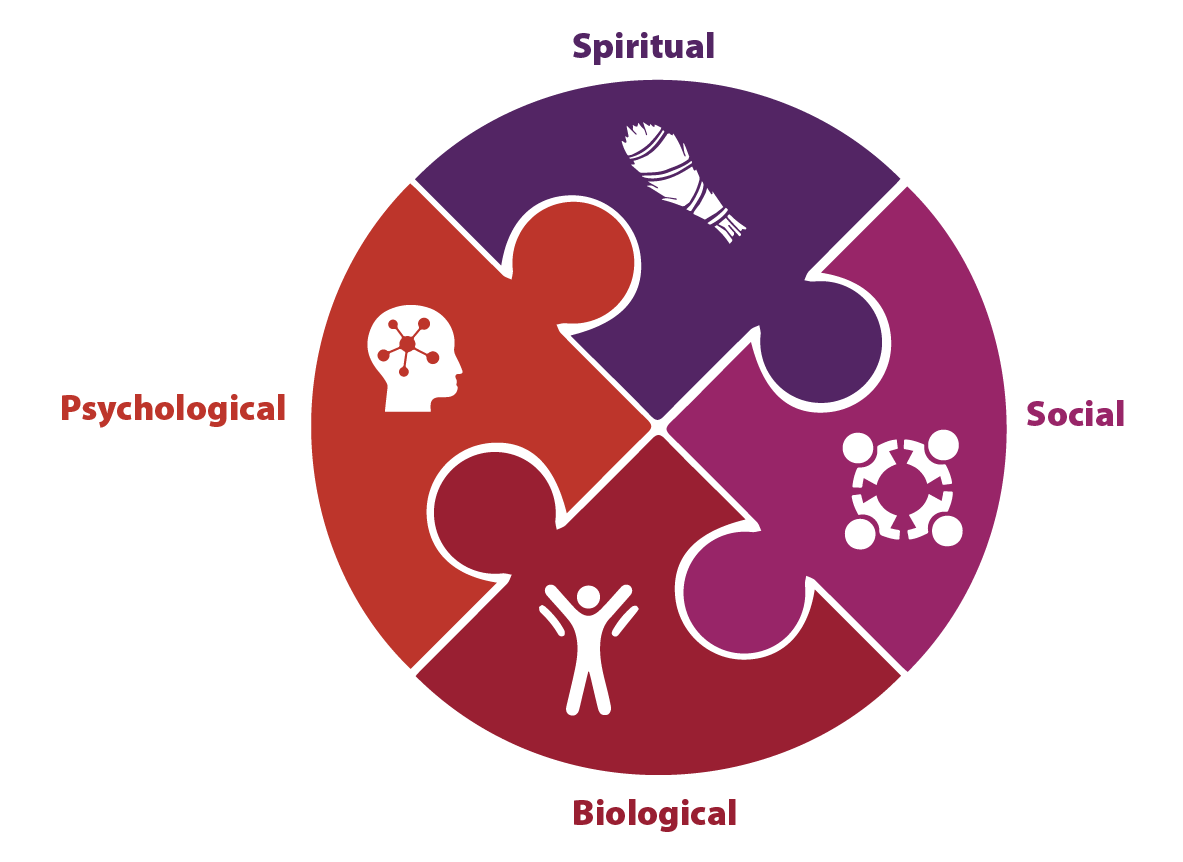 Advancing American Indian/Alaska Native Substance Use Research in the CTN Advancing American Indian/Alaska Native Substance Use Research in the CTN
Introduction by Carmen Rosa, MS, CCTN, NIDA
American Indian/Alaska Native (AI/AN) populations experience disproportionately high rates of substance use as well as associated negative health and social consequences. AI/AN communities have also been severely impacted by the opioid crisis and the COVID-19 pandemic. To address some of the knowledge gaps, the CTN has supported relevant research since the early 2000s (see list of protocols below).
This special issue of the CTN Bulletin first provides an update from the AI/AN Special Interest Group that describes recent activities and ways to contribute to this important topic, followed by a description of the studies conducted in the CTN during the past five years. Most of the protocols developed address both opioid use as well as the impact of COVID-19 in AI/AN communities and families across the nation. The investigators involved on these projects have established community advisory boards that provide relevant and key input into protocol development, implementation, and dissemination.
This issue provides a spotlight for several CTN research projects, including study CTN-0096. This randomized trial explores the integration of medications for opioid use disorder (MOUD) with AI/AN traditional healing and is supported by the NIH HEAL initiative (the graphic above was developed for this project).
Other studies explore treatment approaches, including barriers to treatment and use of technology. One project is building infrastructure and focusing on communities to develop future research. Finally, a couple of studies are assessing the impact of COVID-19 on AI/AN communities' mental health as well as substance use treatment and recovery.
Another impact of this research is the development and support of AI/AN investigators that are either early or mid-career and a strengthening of community engagement. The CTN remains committed to furthering AI/AN substance use research and to supporting the development of the research infrastructure needed to advance this work towards the goal of addressing the significant health disparities experienced by AI/AN populations.
We hope you enjoy this special issue!
AI/AN-Related Protocols in the CTN
- CTN-0020-A-1: Job Seekers' Training for Clients/Relatives with Drug Dependence
- CTN-0033-Ot: Methamphetamine Use among American Indians/Alaska Natives
- CTN-0078-Ot: Knowledge of and Attitudes about Medications for Opioid Use Disorder Within Two Pacific Northwest American Indian Tribes
- CTN-0096: Culturally Centering Medications for Opioid Use Disorder (MOUD) with American Indian and Alaska Native Communities (Tribal MOUD)
- CTN-0096-A-1: National Medication-Assisted Treatment Survey of Substance Use Disorder Programs Serving American Indian and Alaska Native People
- CTN-0118: Examining the COVID-19 Public Health Emergency on Policy, Substance Use Disorder Treatment, and Resilience among American Indian and Alaska Native Communities
- CTN-0123: Facebook Intervention for Preventing Opioid Relapse among American Indian Women: Wiidookaage'win Pilot Preparatory Study
- CTN-0129: The Great Plains Initiative
|
CTN Trial Progress
 Randomizations for Active Studies as of the August 15 Trial Progress Report. Randomizations for Active Studies as of the August 15 Trial Progress Report.
CTN-0080 - Enrolled 99
CTN-0097 - Enrolled 415
CTN-0098 - Enrolled 65
CTN-0099 - Enrolled 1083
CTN-0099-A-1 - Enrolled 88
CTN-0100
Discontinuation - Enrolled 66
Retention - Enrolled 427
CTN-0101 - Enrolled 167
CTN-0107 - Enrolled 66
CTN-0108 - Enrolled 41
|
· · · · · · · · · · · · · · · · · · · · · · · · · · · · · · · · · · · · · · · ·
· · · · · · · · · · · · · · · · · · · · · · ·
CTN American Indian/Alaska Native Special Interest Group (SIG)
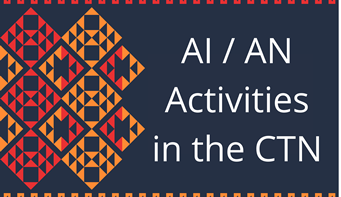 The National Institute on Drug Abuse, Clinical Trials Network, American Indian and Alaska Native Special Interest Group (NIDA CTN AI/AN SIG) provides a forum for AI/AN and ally researchers, clinicians, educators, community members, and NIDA representatives to engage in critical dialogue regarding current concerns and priorities related to the prevention and treatment of substance use, co-occurring mental health, and other life challenges. We work to promote wellness and good health in AI/AN communities. We meet via video-conference (or phone is an option for all) on a monthly or bi-monthly basis dependent on need. The National Institute on Drug Abuse, Clinical Trials Network, American Indian and Alaska Native Special Interest Group (NIDA CTN AI/AN SIG) provides a forum for AI/AN and ally researchers, clinicians, educators, community members, and NIDA representatives to engage in critical dialogue regarding current concerns and priorities related to the prevention and treatment of substance use, co-occurring mental health, and other life challenges. We work to promote wellness and good health in AI/AN communities. We meet via video-conference (or phone is an option for all) on a monthly or bi-monthly basis dependent on need.
Within the past several years, AI/AN SIG members have:
- participated in a NIDA Listening Session focused on efforts to address the opioid crisis among urban and reservation-based AI/AN populations
- developed and presented a pre-conference workshop on cultural considerations for implementing medications for Opioid Use Disorder at an IHS national behavioral health conference
- collaborated with NIDA to develop and distribute educational materials about treatment options for Native persons experiencing Opioid Use Disorder
- completed a survey of group members to inform future directions of the SIG
- developed and submitted a scoping review manuscript (currently under review)
- developed a poster targeting opioid use in pregnant women, as well as a brochure addressing opioid use disorder, currently under revision
Recent activities also include the development of three workgroups which are available for group members who are interested:
- Data Use and Sharing Workgroup: focuses on methods for respecting Tribal sovereignty and receiving all relevant permissions when collecting data from Tribal nations, as well as ensuring all information shared is done so in a way that respects Native cultures and acknowledges the contribution of Tribal partners;
- Inclusion in Clinical Trial Research and Practice: focuses on engaging Tribal communities and investigators to identify areas of local concern, to collaborate in developing research concepts that address those concerns, and to work with CTN investigators to promote appropriate inclusion and representation of AI/AN populations in studies that are not Native-specific;
- Publications and Promotions Workgroup: focuses on developing forums for sharing information relevant to Tribal communities, which may include the development of publications, developing other written information for distribution, presentations both within and outside of the CTN, and/or sharing other helpful information with colleagues and Tribal partners.
Who is welcome? Do I have to be an AI/AN to be a part?
Anyone with an interest in learning more about promoting wellness and good health to address substance use in AI/AN populations is welcome! While some members are AI/AN, many are non-Native allies.
How can I benefit from being a part of this group?
The AI/AN SIG offers the opportunity to collaborate with a diverse set of individuals to learn and contribute through:
- Regular presentations on issues relevant to AI/AN substance use and health
- Development and submission of manuscripts
- Informing new research with AI/AN populations
- Building relationships with AI/AN communities
To join the AI/AN email list, contact Sean Randol: Randol@leedmci.com.
· · · · · · · · · · · · · · · · · · · · · · · · · · · · · · · · · · · · · · · ·
· · · · · · · · · · · · · · · · · · · · · · ·
|
CTN AI/AN Protocol Updates
CTN-0096 - Culturally Centering Medications for Opioid Use Disorder (MOUD) with American Indian and Alaska Native Communities (Tribal MOUD)
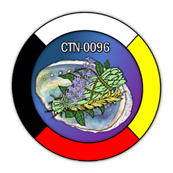 Protocol CTN-0096 is a formative study to develop (Aim 1, Phase I, completed) and test (Aim 2, Phase II) a program-level implementation intervention to support four healthcare and addiction specialty programs serving American Indian and Alaska Native (AI/AN) communities in culturally centering the delivery of medications to treat opioid use disorder (MOUD). Protocol CTN-0096 is a formative study to develop (Aim 1, Phase I, completed) and test (Aim 2, Phase II) a program-level implementation intervention to support four healthcare and addiction specialty programs serving American Indian and Alaska Native (AI/AN) communities in culturally centering the delivery of medications to treat opioid use disorder (MOUD).
Read more about Phase I and II in the complete update here.
We have thoroughly enjoyed getting to know our collaborative board members and community research partners as we work in partnership to reduce the substantial opioid-related health disparities in many AI/AN communities.
We are thrilled to share that our two Step 1 sites: the Native American Community Clinic (NACC) in Minneapolis, MN and the Anpetu Luta Otipi (ALO) clinic, Oglala Sioux Tribe (OST), in Kyle, SD, initiated the intervention phase in June 2022. This phase involves bimonthly workgroup meetings with providers, other staff, and project practice facilitators to explore and identify goals to enhance each program’s cultural centering of MOUD. Workgroup meetings are structured using implementation science strategies, including Indigenous implementation science frameworks. Congratulations to NACC and OST!
Our Step 2 sites: Southcentral Foundation (SCF) in Anchorage, AK, and the Sophie Trettevick Indian Health Center (STIHC), Makah Tribe, in Neah Bay, WA, who will begin the intervention in December 2022. Congrats and thanks to all of the CTN-0096 partner research sites!
Photo: Indian Pueblo Cultural Center, October 2019, Albuquerque, NM
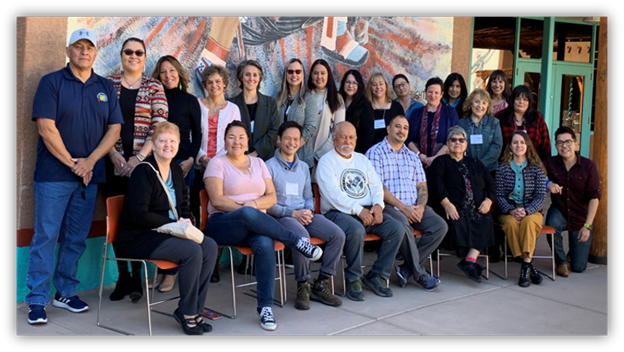
CTN-0096-A-1 - National Medication-Assisted Treatment Survey of Substance Use Disorder Programs Serving American Indian and Alaska Native People
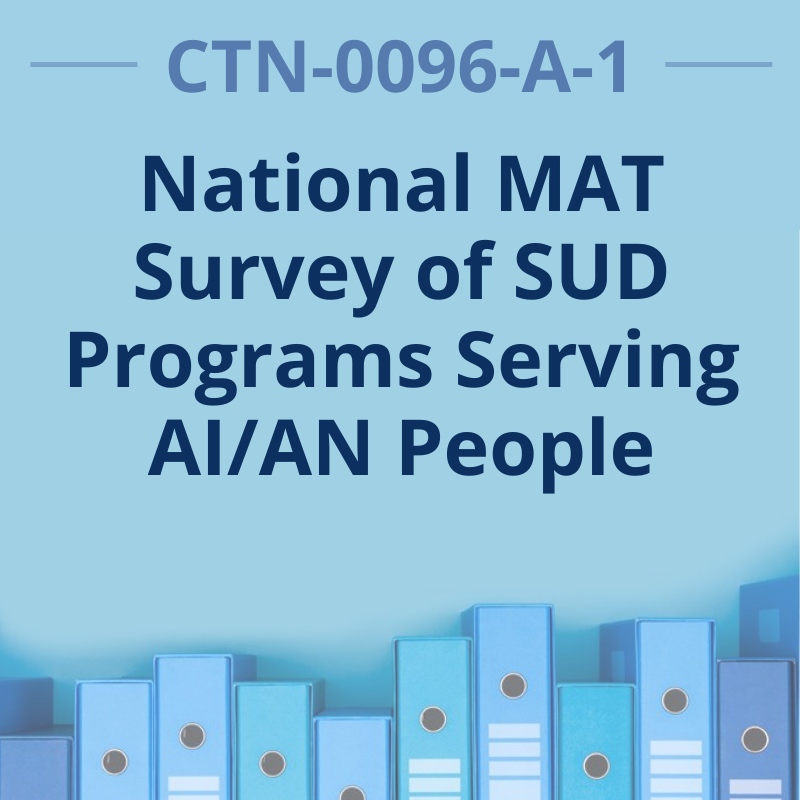 This study, CTN-0096-A-1, seeks to provide a detailed description of the use of MATs for Opioid Use Disorders in health care systems and substance use disorder treatment programs serving AI/AN communities, much-needed insights regarding the dynamics around the decision to implement such practices, and carefully formulated methods for more effective dissemination. This study, CTN-0096-A-1, seeks to provide a detailed description of the use of MATs for Opioid Use Disorders in health care systems and substance use disorder treatment programs serving AI/AN communities, much-needed insights regarding the dynamics around the decision to implement such practices, and carefully formulated methods for more effective dissemination.
Study aims include 1) describe the use of MATs for Opioid Use Disorders in health care systems and substance use disorder treatment programs serving AI/AN communities; 2) describe the factors associated with the implementation of MATs for Opioid Use Disorders in these systems and programs; and 3) identify methods for more effective dissemination of MATs to health care systems and substance use disorder treatment programs serving AI/AN communities.
The study implementation was significantly impacted by the COVID-19 pandemic. As tribal clinics had to adapt to the unanticipated pandemic ridden environment many were left short-staffed and with less substance use treatment resources as priority was shifted to COVID-19 response. Under these circumstances, the research team found that most treatment centers did not have the capacity to engage with non-COVID related research activities. The recruitment strategy has been adapted and the study is currently actively recruiting and plan to close recruitment by the end of December 2022.
CTN-0118 - Examining the COVID-19 Public Health Emergency on Policy, Substance Use Disorder Treatment, and Resilience among American Indian and Alaska Native Communities
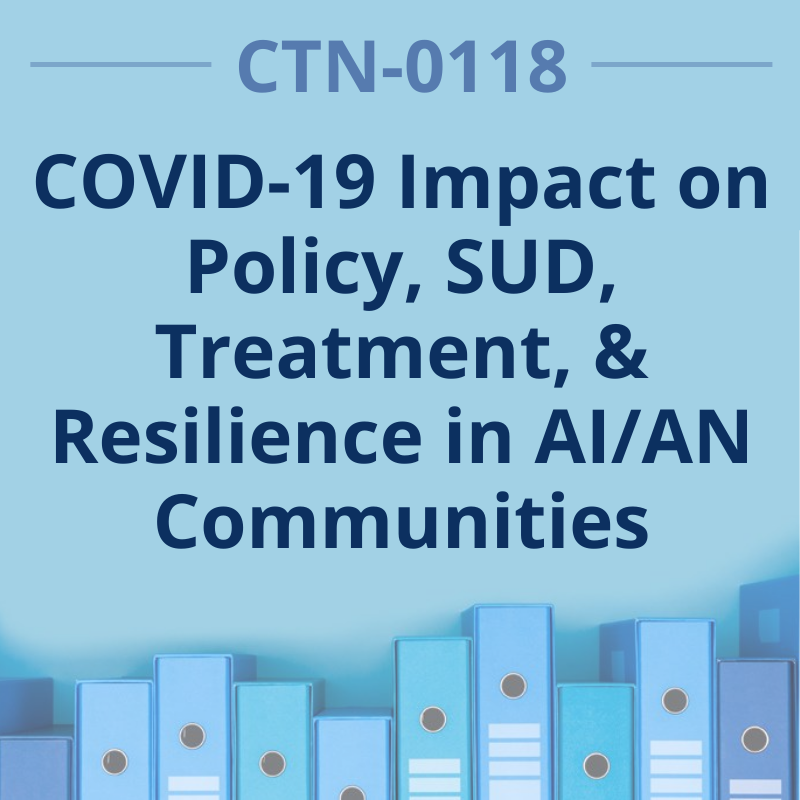 Since COVID-19 was declared a public health emergency, federal regulations guiding addiction services delivery were modified, including within American Indian and Alaska Native (AI/AN) communities. Changes included expansion of telemedicine and virtual behavioral health delivery, adjusting medication dosing strategies for opioid use disorder, and altering reimbursement and confidentiality policies and practices for addiction services. Since COVID-19 was declared a public health emergency, federal regulations guiding addiction services delivery were modified, including within American Indian and Alaska Native (AI/AN) communities. Changes included expansion of telemedicine and virtual behavioral health delivery, adjusting medication dosing strategies for opioid use disorder, and altering reimbursement and confidentiality policies and practices for addiction services.
Although these policy shifts were to promote availability and access, little is known about the adoption, implementation, and effectiveness of these changes among programs serving AI/AN communities. Rapid research on the dissemination, adoption, and implementation of federal addiction policies among AI/AN-serving addiction treatment programs, including the voices and lived experiences of relatives/consumers, is of vital importance.
The specific aims of CTN-0118 (Lead Investigator Katherine Hirchak) are to assess the dissemination, adoption, and implementation of COVID-19 policy and regulations at Tribal, state, and federal levels by adding quantitative questions about COVID-19 to the National Tribal Addiction Survey (CTN-0096-A-1; LI Doug Novins)
We have made progress and achieved several milestones in 2022. After successfully partnering with two Tribal communities, in addition to concerted recruitment efforts out of urban areas in the Pacific and Inland Northwest, we were able to surpass our original recruitment goal (N=50). We have completed interviews with 24 providers and 57 relatives/consumers (N=81). The qualitative codebooks have been developed and data analysis is underway. Read more about this study in the full update here.
|
CTN-0123 - Facebook Intervention for Preventing Opioid Relapse among American Indian Women: Wiidookaage'win Pilot Preparatory Study
 The Wiidookaage’win study (CTN-0123), Lead Investigator Christi Patten, PhD, Mayo Clinic, MN) aims to use a community-based participatory approach to develop a culturally relevant social media intervention for reducing opioid relapse among American Indian and Alaska Native (AIAN) women. The opioid epidemic is a major public health problem that disproportionately affects Native communities influenced primarily by social determinants of health and historical trauma. While gender-specific factors for opioid relapse in women have been identified (i.e., perceived stress, lack of social support), gender-specific interventions for Native women do not exist. The Wiidookaage’win study (CTN-0123), Lead Investigator Christi Patten, PhD, Mayo Clinic, MN) aims to use a community-based participatory approach to develop a culturally relevant social media intervention for reducing opioid relapse among American Indian and Alaska Native (AIAN) women. The opioid epidemic is a major public health problem that disproportionately affects Native communities influenced primarily by social determinants of health and historical trauma. While gender-specific factors for opioid relapse in women have been identified (i.e., perceived stress, lack of social support), gender-specific interventions for Native women do not exist.
Consistent with the cultural value of interdependence, social media-formed groups to prevent opioid relapse could lead to greater adoption and sustainability by encouraging collaborative efforts across generations of Native women and leveraging community resilience for coping with stress. The study concept was developed with Native community partners in Minnesota.
This single-site study focuses on AIAN women residing in Minnesota with at least 1 month of abstinence from illicit opioid use and current use of medication for opioid use disorder. The digital intervention to be developed is a private, hidden, moderated Facebook group that will be active for 3 months. The study's three phases will involve qualitative interviews, development of the Facebook content library and a moderator exchange, and beta-testing. Read more about this protocol in the complete update here.
A community advisory committee (CAC) was formed comprised of AIAN women with lived experience, health care providers, and AIAN community partners. The CAC has met five times by Zoom to co-design the protocol and intervention and to guide all project activities. With the CAC, potential Facebook moderator postings were designed and iteratively refined to incorporate content (text, images, and videos) consistent with AIAN culture and values. At the advice of the CAC, a Native Elder woman named the study Wiidookaage’win which means "the place for help and time for helping" in Ojibwe and reflects healing and community.
A local Native artist developed original art for the study logo and Facebook posts (see graphic above). The research team has completed phase 1 interviews with 12 AIAN women and 9 interested parties to date and is generating preliminary response themes using content analysis. The moderator exchange is completed. The next steps are to refine the Facebook content library and conduct the beta-testing.
CTN-0129 - The Great Plains Initiative
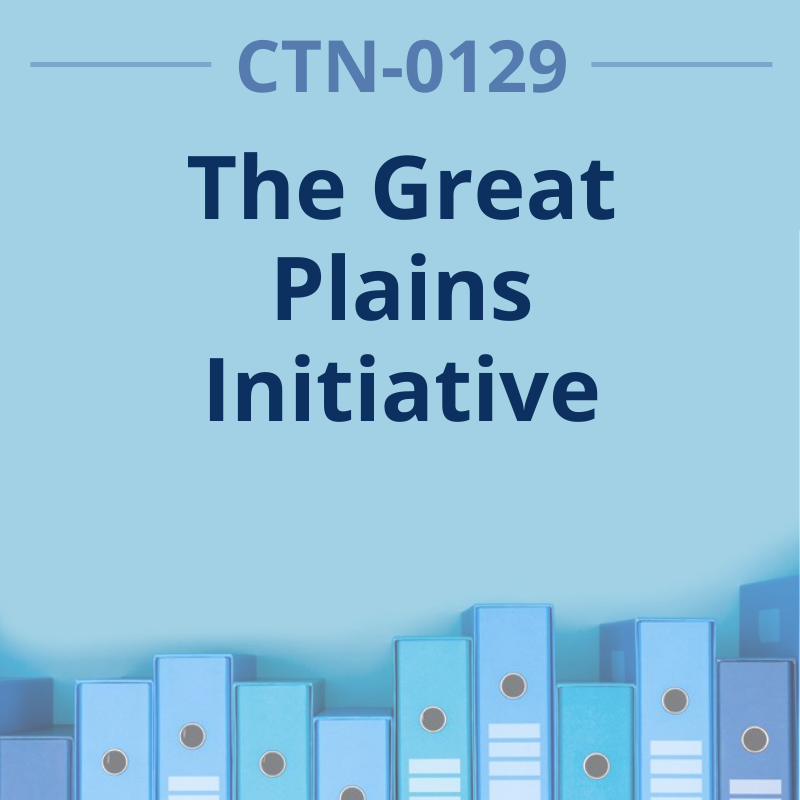 Tribal communities in the Great Plains are diverse, and each has concerns and priorities to address addiction and recovery focused on local needs. There has been increasing concern about the use of opioids and methamphetamine, and data indicates that tribes in the Great Plains region (North/South Dakota, Nebraska, Iowa) suffer from many health and socioeconomic disparities at rates even greater than the other US tribal regions. Further, treatment resources in this region are geographically dispersed, adding to the already- long list of general barriers to substance use disorder (SUD) treatment. Tribal communities in the Great Plains are diverse, and each has concerns and priorities to address addiction and recovery focused on local needs. There has been increasing concern about the use of opioids and methamphetamine, and data indicates that tribes in the Great Plains region (North/South Dakota, Nebraska, Iowa) suffer from many health and socioeconomic disparities at rates even greater than the other US tribal regions. Further, treatment resources in this region are geographically dispersed, adding to the already- long list of general barriers to substance use disorder (SUD) treatment.
CTN-0129 will build collaborations with reservation-based treatment centers and urban clinics serving AIs in the Great Plains to define treatment needs and to determine research priorities with tribal communities and not for them. Read about the study's 2 objectives in the full update here.
The Great Plains Initiative is a collaboration between CTN Ohio Valley Node researchers at the University of Cincinnati and at the University of North Dakota (LI: Donald Warne, MD). At present, the team is completing pre-initiation tasks, and has received the support of the Great Plains Behavioral Health Directors. Plans are underway to begin data collection at the two participating urban sites within the next few weeks. Work is in progress to obtain all necessary approvals for the six reservation-based programs who have expressed interest in study participation.
CTN-0078 - Knowledge of and Attitudes about Medications for Opioid Use Disorder Within Two Pacific Northwest American Indian Tribes
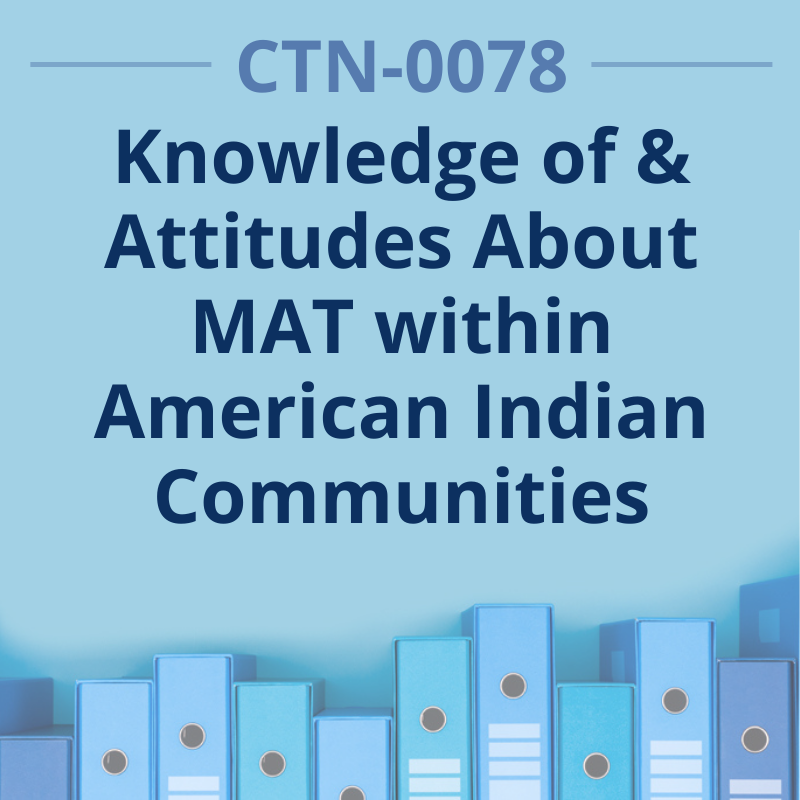 This study addresses critical barriers in the implementation of medication assisted treatment (MAT) for opioid use disorders (OUDs). MAT approaches have been shown to substantially improve outcomes for those with OUDs, yet provider and consumer/client knowledge, perceptions and beliefs about MAT, as well as organizational barriers to MAT use, are widespread. This study addresses critical barriers in the implementation of medication assisted treatment (MAT) for opioid use disorders (OUDs). MAT approaches have been shown to substantially improve outcomes for those with OUDs, yet provider and consumer/client knowledge, perceptions and beliefs about MAT, as well as organizational barriers to MAT use, are widespread.
In some tribal communities there is a preference for total abstinence, and medications for OUD recovery are not well understood. Study results will inform future efforts to tailor MAT for high-need, low-resource American Indian/Alaska Native (AIAN) populations.
All data collection has been completed and the study team continues to collaborate with the communities to share study findings through presentations and discussions, reports and publications. Twenty-four semi-structured individual and group interviews were conducted with 58 community members with varying roles in the community: treatment center clients and providers, Tribal leaders, and other key community stakeholders.
Given the COVID 19 epidemic and the enormous effect on AIAN communities and treatment/recovery programs, additional interviews were conducted to assess the impact on mental health and substance use treatment during the pandemic. The team has analyzed data and has written two manuscripts for publication, pending community approvals. |
· · · · · · · · · · · · · · · · · · · · · · · · · · · · · · · · · · · · · · · ·
· · · · · · · · · · · · · · · · · · · · · · ·
Upcoming Events
 CCTN Webinar: Prehospital Treatment for OUD CCTN Webinar: Prehospital Treatment for OUD
September 6, 2022 | 11am-5pm ET | Register here
The NIDA CCTN is convening stakeholders, experts, and federal staff to present recent research and innovative EMS or paramedic administered approaches for opioid use disorder and overdose and to identify research needed to evaluate prehospital approaches for opioid use disorder. The meeting will highlight promising research, describe innovative programs in the United States, and identify research priorities to inform research planning.
If you have any questions about the meeting logistics, please contact CTNSupport@leedmci.com. If you have any questions about this event, please contact Dr. Kristen Huntley at kristen.huntley@nih.gov. Find out more about this event here.
 Telemedicine SIG Webinar: Telemedicine Use and OUD During COVID Telemedicine SIG Webinar: Telemedicine Use and OUD During COVID
September 9, 2022 | 8:30am PT | Join the SIG or register for this webinar by emailing Megan Black, MPH: MBlack@mednet.ucla.edu
The CTN Telemedicine (TM) Special Interest Group (SIG) welcomes guest presenters Alisa Busch, M.D., M.S., Michael Barnett, M.D., and Ruth Hailu, A.B. for a webinar about the association between telemedicine use and opioid use disorder treatment during the COVID-19 pandemic, including steps for future research. Find out more about this event here.
· · · · · · · · · · · · · · · · · · · · · · · · · · · · · · · · · · · · · · · ·
· · · · · · · · · · · · · · · · · · · · · · ·
News from the Nodes
Appalachian Node
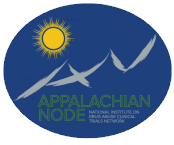 The Appalachian Node is excited to announce Dr. Erin Winstanley, PhD, Associate Professor at West Virginia University, has been newly appointed as multi-PI. Dr. Judith Feinberg, is stepping down from that role as she has consolidated her professional commitments. The Appalachian Node is excited to announce Dr. Erin Winstanley, PhD, Associate Professor at West Virginia University, has been newly appointed as multi-PI. Dr. Judith Feinberg, is stepping down from that role as she has consolidated her professional commitments.
Dr. Feinberg remains actively involved in the Appalachian Node as a Co-Investigator.
Under the leadership of Drs. Liebschutz (University of Pittsburgh) and Winstanley, the Appalachian Node will continue to promote impactful research to address opioid use disorder.
New England Consortium Node
Dr. Edouard Coupet II, MD, MS, of Yale Department of Emergency Medicine, was awarded a Diversity Supplement. The title of the study is, Racial/Ethnic Disparities in Addiction Treatment Access for Opioid Use Disorder from the Emergency Department.
Brief Description: The emergency department (ED) represents an emerging setting to initiate medications for opioid use disorder and provide linkage to ongoing addiction treatment for Black and Latino populations with untreated OUD. Yet Black and Latino individuals with untreated OUD face significant disparities in access to ongoing addiction treatment following an ED visit. The goal of this proposal is to elicit potential targets for ED-based interventions that improve engagement in addiction treatment among Black and Latino individuals with untreated OUD. The specific aims are to: 1) conduct a qualitative study focusing on patterns of barriers and facilitators to engaging in addiction treatment among Black, Latino, and non-Latino White patients receiving ED-initiated buprenorphine treatment with a referral for continuation of OUD treatment outside of the ED and 2) evaluate differences among Black, Latino, and non-Latino White ED patients with untreated OUD on factors previously identified as predictors of worse treatment outcome, including opioid overdose, polysubstance use, major depressive disorder, and stigma, using supplemental analyses of data collected in CTN 0099. To accomplish this, we will conduct both semi-structured individual interviews of Black, Latino, and non-Latino White participants enrolled in CTN 0099 after they have completed their final 30-day assessments and supplemental analyses from data collected in CTN 0099. Study findings will inform the development of an ED-based intervention that enhances engagement in addiction treatment among Black and Latino populations subsequent to ED visit.
Western States Node
 A piece titled Youth and Fentanyl: What Every Family Needs to Know on the OHSU news page reported on a recent roundtable discussion involving members of the Western States Node. A piece titled Youth and Fentanyl: What Every Family Needs to Know on the OHSU news page reported on a recent roundtable discussion involving members of the Western States Node.
A surge of illicit fentanyl in the Pacific Northwest is supercharging an opioid epidemic with counterfeit pills that are 50 to 100 times more potent than heroin, cheap and readily available -- often to young people who make the potentially deadly mistake of viewing them as no more dangerous than cigarettes.
Oregon Health & Science University hosted a roundtable discussion Wednesday, June 29, to raise community awareness, especially among parents, school officials and health care professionals. The panel included Jennifer and Jon Epstein, parents who lost their son Cal after he overdosed on a counterfeit pain pill laced with fentanyl in 2020, as well as Todd Korthuis, MD, PhD, Ana Hilde, MD, MPH, Tony Vezina, Olivia Rae Wright, MD, Honora Englander, MD, and others.
New from the ATTC
How accessible are Opioid Use Disorder medications and what's stymying access? Two pieces in the latest ATTC Messenger (by Ned Presnall, LCSW and Kimberly A. Johnson, PhD, explore the question.
Embracing change: The fluidity of evidence-based SBIRT, by Diana Padilla of the Northeast & Caribbean ATTC explores a case study of an expanded application of SBIRT related to depression screening in Black churches. (ATTC/NIATx Service Improvement Blog)
|
Ohio Valley Node
 Study updates from the Ohio Valley Node: Study updates from the Ohio Valley Node:
CTN-0080 - Medication treatment for Opioid use disorder in expectant Mothers (MOMs): a pragmatic randomized trial comparing extended-release and daily buprenorphine formulations
This study aims to evaluate the impact of treating Opioid Use Disorder in pregnant individuals with extended-release buprenorphine, compared to sublingual buprenorphine on mother and infant outcomes. UPDATE: The study experienced a pause in recruitment this past spring due to a gap in the XR medication supply. Upon resupply, 7 of the original 12 sites resumed recruitment, joined by a new site in West Virginia. The study is nearing its 100th randomization, which will be half of the target recruitment goal.
CTN-0125 - Using Integrative Data Analysis to Examine the Impact of Psychosocial Treatments for Black Cocaine Users Enrolled in the NIDA Drug Abuse Treatment Clinical Trials Network (CTN)
This study aims to evaluate the effectiveness of substance use disorder treatments for Black people who use cocaine and is a joint effort between the OVN, the WSN, and the NEC. Kathy Burlew (UC/OVN) and Lesia Ruglass (CCNY/WSN) are Co-LIs for this project. UPDATE: CTN-0125 has progressed to the first stage of data analyses of the 9 studies. Data harmonization is nearly complete, which will allow the team to move to the Integrative Data Analysis. A draft of a manuscript describing the protocol is in progress.
CTN-0114 - Drug Repurposing for Cocaine Use Disorder (CUD) Using a Combined Strategy of Artificial Intelligence (AI) – Based Prediction and Retrospective Clinical Corroboration (AI-4-CUD)
CTN-0114 includes three components. Stage I-a is the Artificial Intelligence (AI)-based generation of a list of promising candidate anti-cocaine use disorder (CUD) drugs. Stage I-b uses a limited data set of CUD-diagnosed patient electronic health record (EHR) data to identify prescribed medications associated with CUD remission diagnosis. Rong Xu (CWRU/OVN) is LI for this project with T. John Winhusen (UC/OVN) as Co-LI. UPDATE: Stages I-a and I-b have been completed and 87 candidates have been reviewed by the CTN Advisory Committee for potential inclusion in the third study component: Stage II. Stage II entails evaluating anti-CUD candidates using EHRs from 63 healthcare systems with over 86.2 million patients, including 315,183 patients diagnosed with CUD. Stage II has been completed for one candidate (ketamine) and a manuscript detailing the results has been submitted to the CTN PC. A Stage II evaluation of six additional candidates is planned and the potential to evaluate medication combinations will be explored.
CTN-0129 - The Great Plains Initiative
This project is a collaboration among OVN investigators at the University of North Dakota and University of Cincinnati along with treatment providers serving American Indian populations in the Great Plains to 1) determine community-defined needs for identifying and addressing SUD issues and 2) assess the feasibility and acceptability of telemedicine for MOUD. Donald Warne (UND/OVN) is the LI for this project. UPDATE: The study team is currently completing pre-initiation activities and hope to begin data collection within the next few weeks.
CTN-0134 - Buprenorphine-Precipitated Withdrawal Hotspots and Correlates: Identifying Regional "Hotspots" and Potential Correlates of Precipitated Withdrawal During Buprenorphine Induction in Fentanyl Users Through Prescriber Survey Responses and patient Urine Drug Test Results
This one-group, cross-sectional survey study will characterize the regional variability in the prevalence and correlates of prescriber-reported precipitated withdrawal during buprenorphine induction for individuals using fentanyl in approximately 279 counties in the United States. Millennium Health (MH) will provide urine drug test results from the counties of prescribers who participated in the survey. The urine drug test results and survey data will be merged to assess the association between precipitated withdrawal issues and fentanyl, fentanyl analogues, and other drugs of abuse. LaTrice Montgomery (UC/OVN) is LI for this project with T. John Winhusen (UC/OVN) as Co-LI. UPDATE: The team has currently enrolled 76 active buprenorphine prescribers to participate in the survey. The recruitment window is still open as they aim to reach our goal of recruiting at least 1 active prescriber from each county that has a practice that contracts with MH.
|
· · · · · · · · · · · · · · · · · · · · · · · · · · · · · · · · · · · · · · · ·
· · · · · · · · · · · · · · · · · · · · · · ·
Meet the New CCTN Staff!
The Center for the Clinical Trials Network would like to introduce you to two of their newest staff people -- welcome, Drs. Holtyn and Bertz!
Dr. August Holtyn
 Dr. August Holtyn will serve in the CCTN as a Health Scientist Administrator to assist in the successful implementation of CTN operations and as a Scientific Officer for CTN studies. Dr. August Holtyn will serve in the CCTN as a Health Scientist Administrator to assist in the successful implementation of CTN operations and as a Scientific Officer for CTN studies.
Dr. Holtyn is a behavioral pharmacologist with research experience spanning preclinical medications development and outpatient therapeutic trials. She comes to us from the Department of Psychiatry and Behavioral Sciences at the Johns Hopkins University School of Medicine, where she served as the Associate Director of the Center for Learning and Health. August earned her master’s and doctoral degrees in psychology at West Virginia University under the mentorship of Dr. Michael Perone. In 2015, she joined the faculty in the Johns Hopkins University School of Medicine after completing a post-doctoral fellowship there in behavioral pharmacology under the mentorship of Dr. Kenneth Silverman. August’s prior work has focused on the development and evaluation of behavioral treatment interventions emphasizing therapeutic use of financial incentives, the integration of behavioral (e.g., contingency management) and pharmacological (e.g., naltrexone) interventions, and the use of technology to facilitate delivery of behavioral and pharmacological treatments for substance use disorders.
Dr. Jeremiah Bertz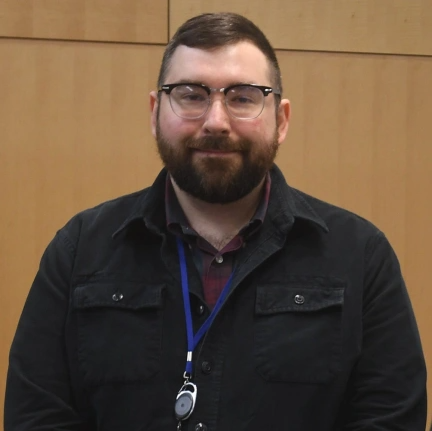
Dr. Jeremiah Bertz will serve in the CCTN as a Health Scientist Administrator to assist in the successful implementation of CTN operations and as a Scientific Officer for CTN studies.
Jeremiah comes to us from the NIDA Intramural Research Program (IRP), where he was a staff scientist in the Office of the Clinical Director. Jeremiah earned his Ph.D. in psychology from the University of Michigan, where he studied the motivational effects of opioid-associated stimuli in animals under the mentorship of Dr. James Woods. After further preclinical training as a post-doctoral fellow in pharmacology at the University of Michigan Medical School, he transitioned to clinical research at the NIDA IRP as a post-doctoral fellow under the mentorship of Drs. Kenzie Preston and David Epstein. At the IRP, his work focused on opioid use disorder treatment outcomes, including assessments of daily life during opioid agonist treatment by various mobile/wearable technologies, as well as designing and implementing translational human laboratory studies and clinical trials of behavioral interventions for people with opioid use disorder and people who drink alcohol.
· · · · · · · · · · · · · · · · · · · · · · · · · · · · · · · · · · · · · · · ·
· · · · · · · · · · · · · · · · · · · · · · ·
NIDA Racial Equity Initiative Funding Opportunity
NIDA has released new Funding Opportunity Announcements (FOAs) for the NIDA Racial Equity Initiative. These FOAs are focused on research to advance equity for racial and/or ethnic minority populations in the U.S.
A webinar is being offered on September 26, 2022 at 3pm ET for those interested in asking questions or learning more about these FOA.
Find more information here! |
Upcoming Events
Facebook Live: The Intersection of Suicide and Substance Use.
September 15, 2022, 12:30-1pm ET (virtual)
This session, airing on NIDA's Facebook page, is in recognition of National Suicide Prevention Month in September.
2022 NIDA-NIAAA Frontiers in Addiction Research Mini-Convention
November 1-2, 2022 11am-3pm PT
(virtual)
Provides a forum for presentations and discussions of current topics in neuroscience and addiction.
|
   
|